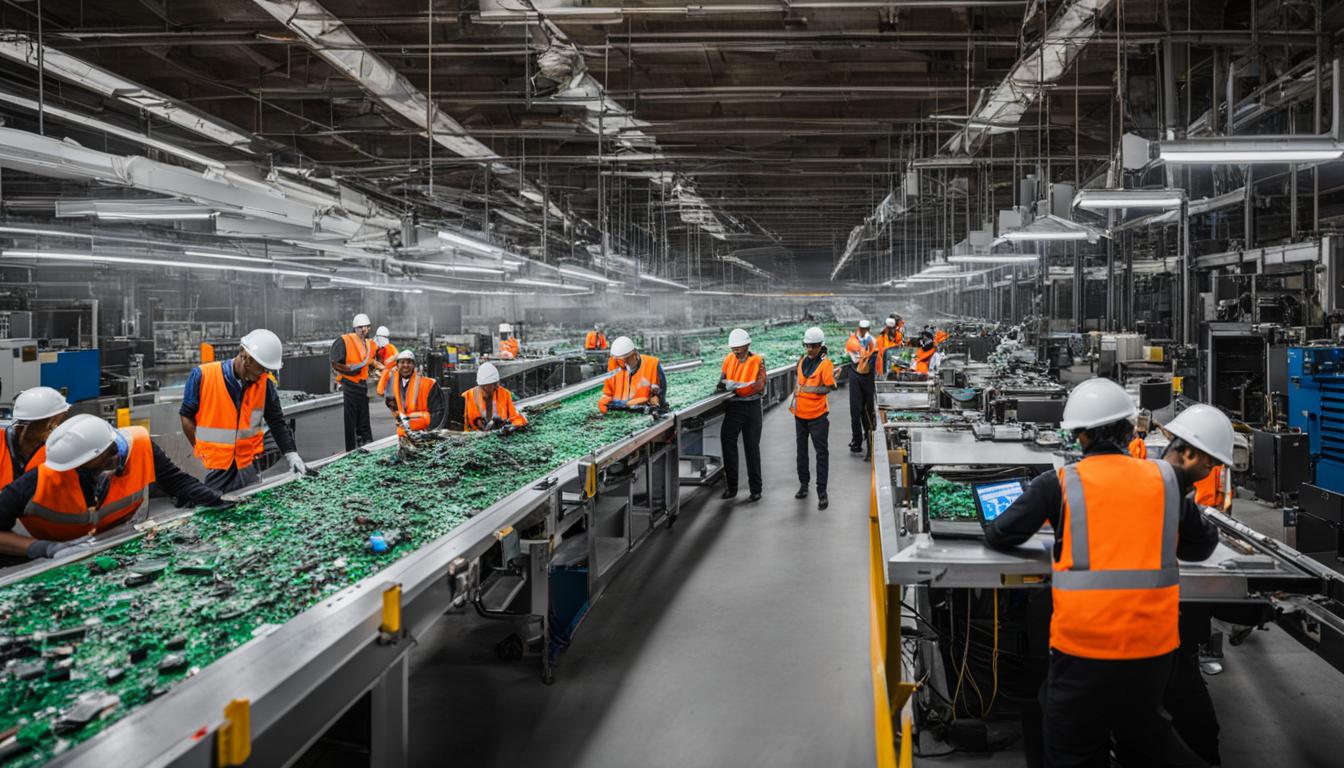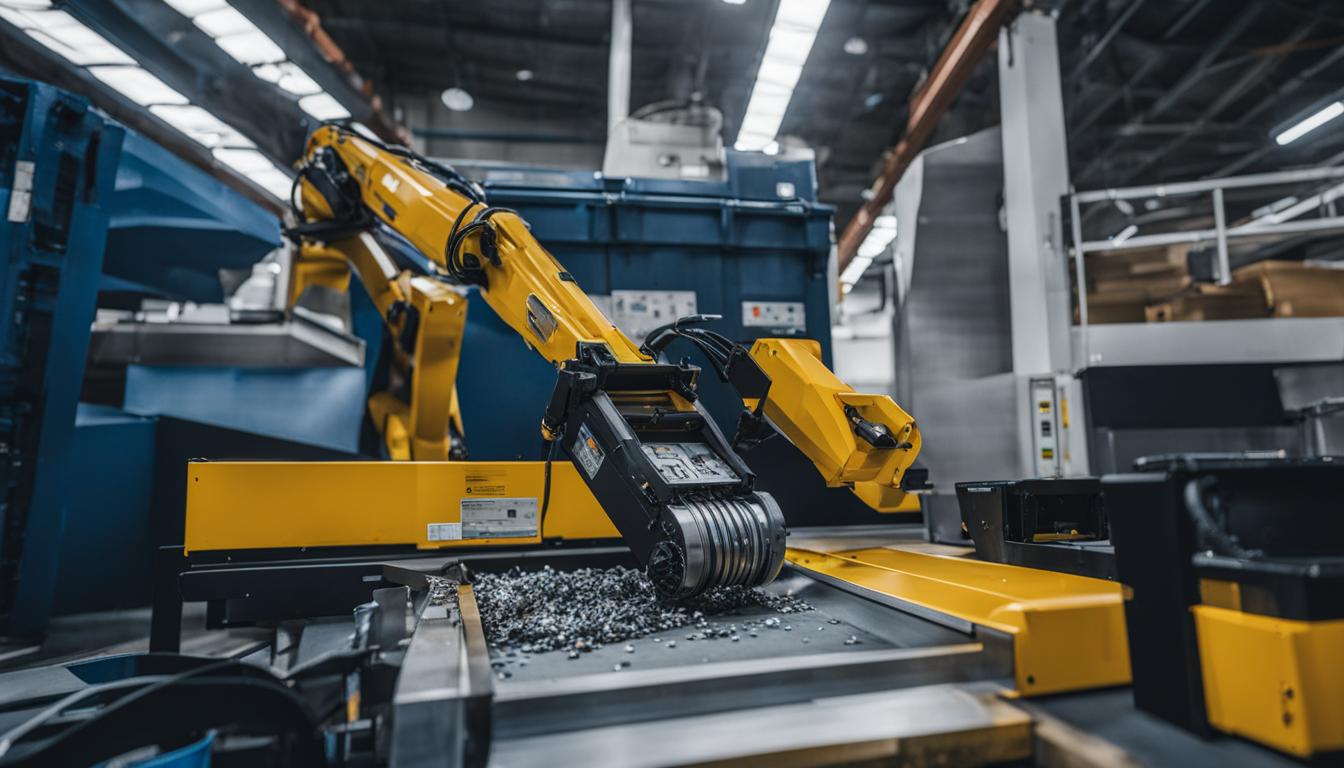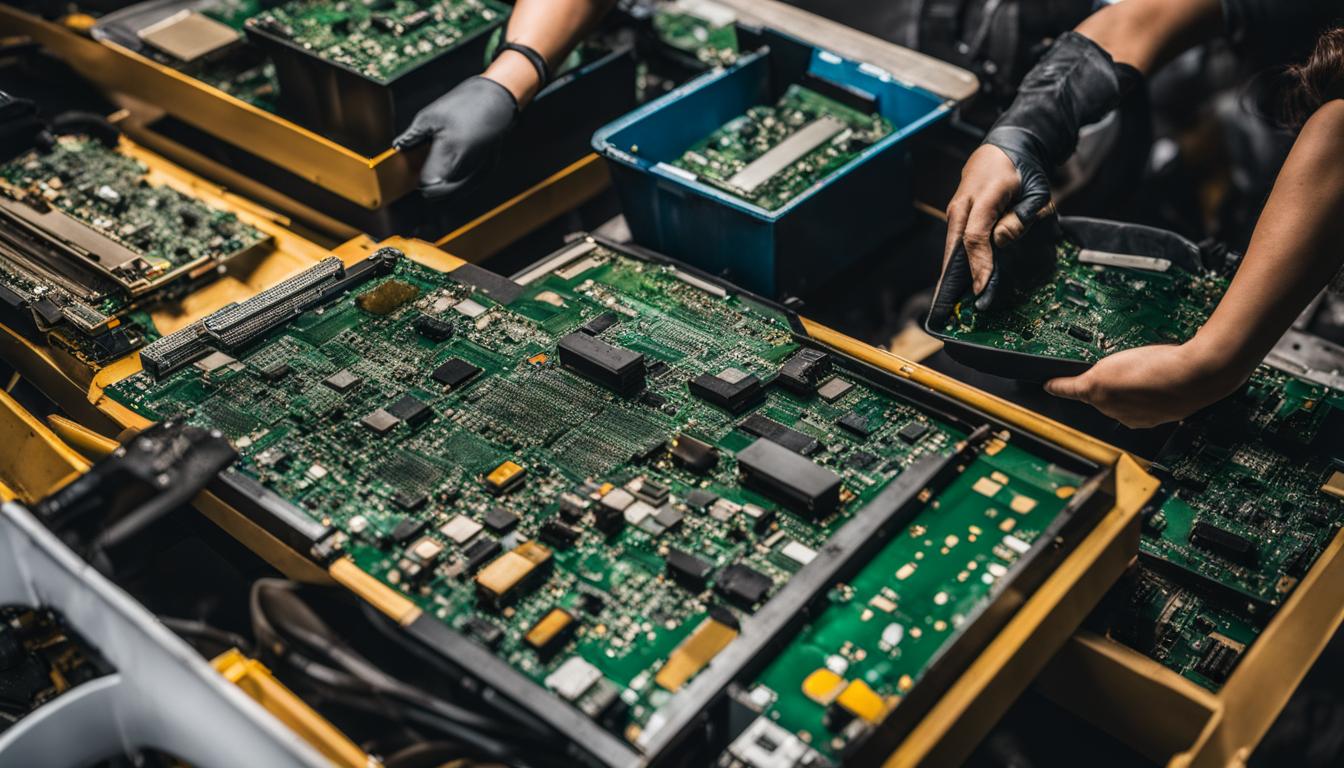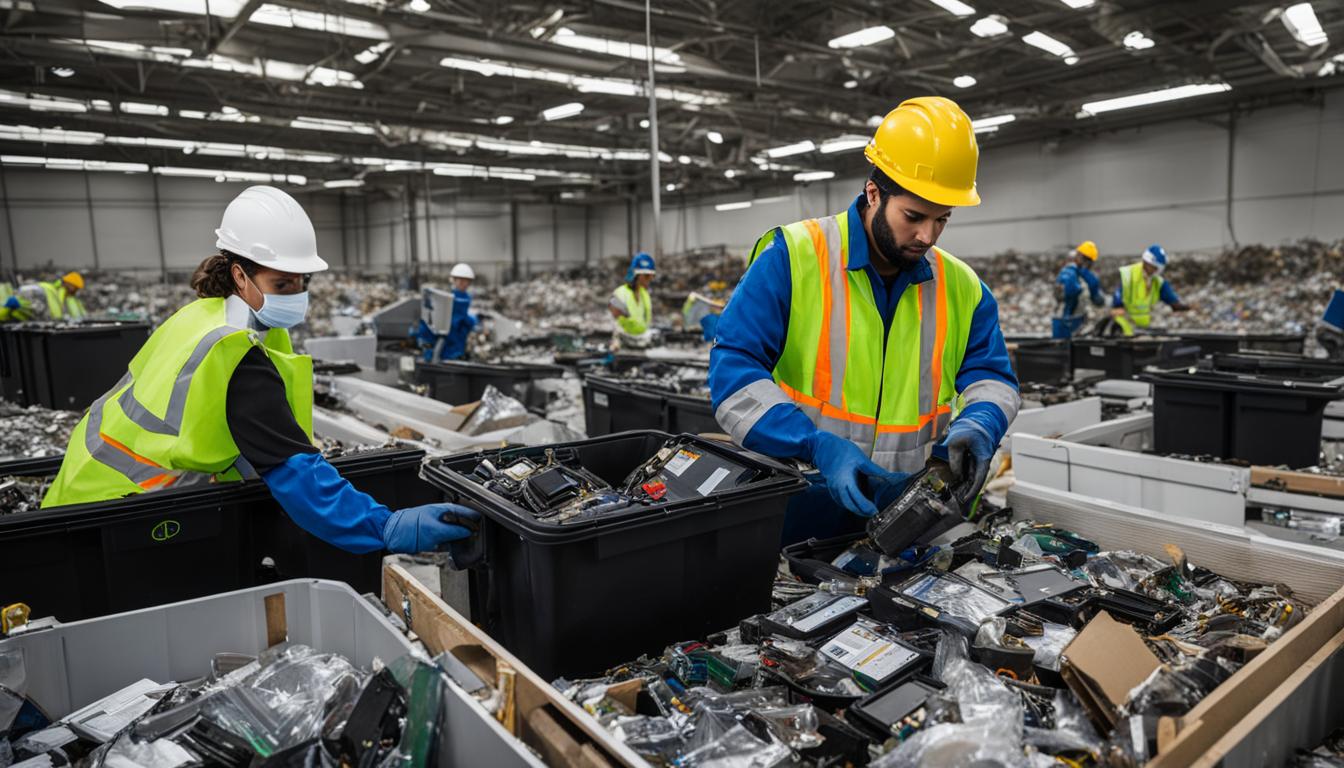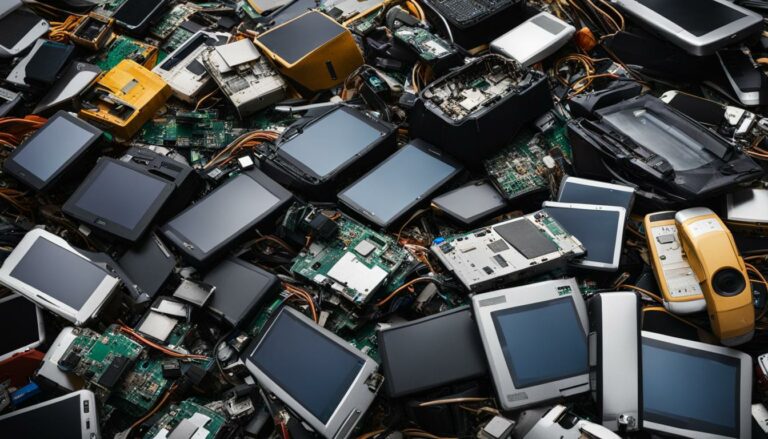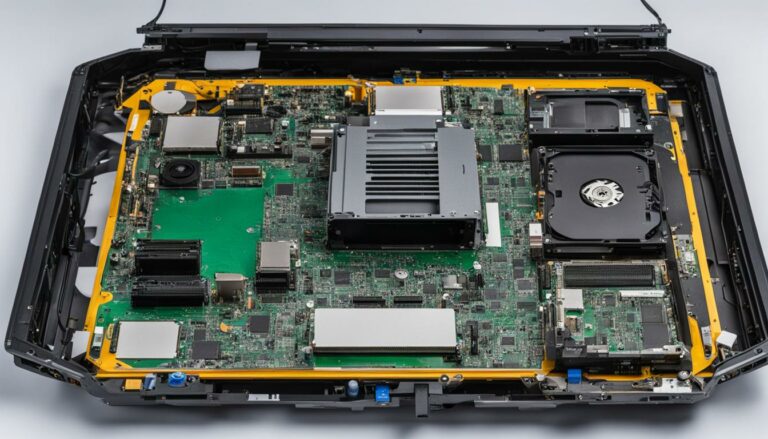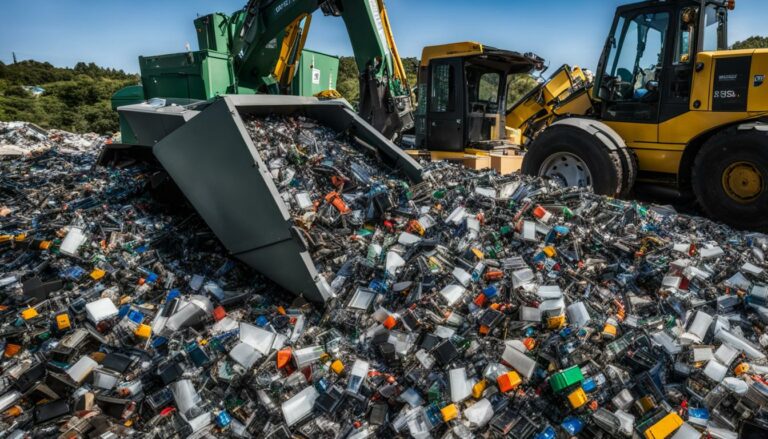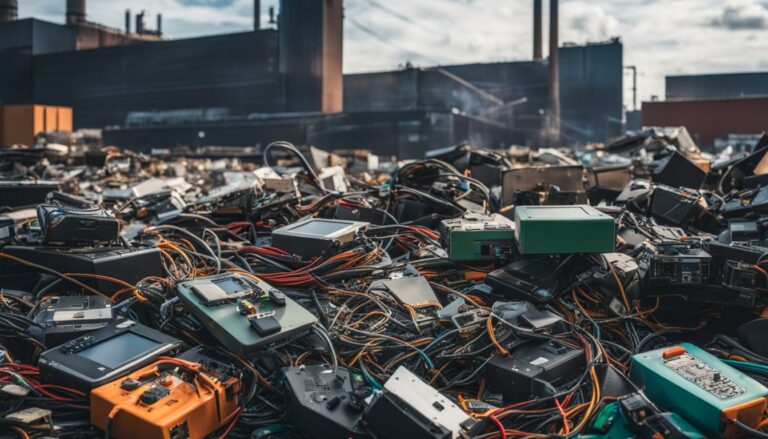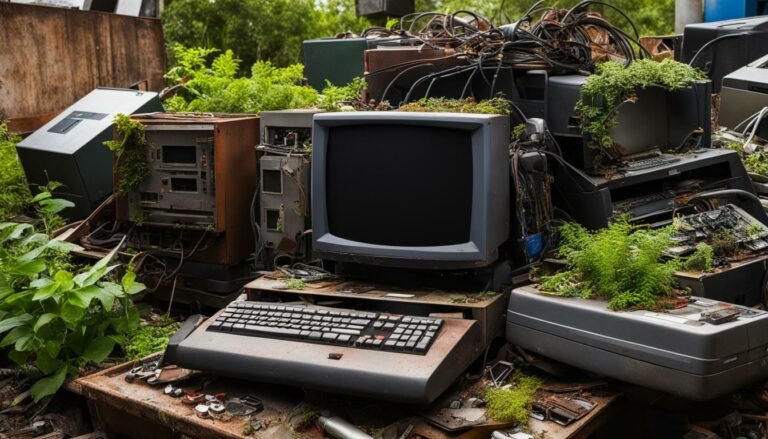The Role of IT Manufacturers in Recycling Efforts
As we move towards a more sustainable future, the role of IT manufacturers in recycling efforts becomes increasingly vital. These manufacturers have a unique opportunity to contribute to a greener world through sustainable technology solutions. By embracing recycling practices and implementing green IT solutions, they can help shape a more environmentally responsible industry.
Technological innovation has revolutionized waste management and production processes. IT manufacturers play a crucial role in giving electronic waste a second life. With over 10,000 tons of waste generated worldwide each year, their contribution is essential in reducing the environmental impact of discarded IT equipment.
Connectivity and digitalization, supported by 5G infrastructure, enable optimized waste management through data analysis and the Internet of Things. These advancements enhance the efficiency of recycling processes and pave the way for a more sustainable technology future.
Moreover, technologies like 3D printing offer tremendous potential for recycling plastic waste and creating new materials from recycled sources, including organic waste. This circular approach to manufacturing not only reduces waste but also conserves natural resources.
Key Takeaways:
- IT manufacturers play a crucial role in recycling efforts and promoting a sustainable technology future.
- Technological innovation improves waste management and production processes.
- Connectivity and digitalization enable optimized waste management through data analysis and the Internet of Things.
- 3D printing technology offers possibilities for recycling plastic waste and creating new materials.
- Embracing green IT solutions contributes to a more environmentally responsible industry.
The Importance of Identifying Recyclable Materials
Effective recycling in the IT industry starts with the identification of recyclable materials. By understanding the various materials generated during operations, businesses can take steps towards responsible waste management and contribute to a more sustainable future. Common recyclable materials in the IT industry include paper and cardboard, plastic products, glass, metals, electronics, and food waste.
Table: Common Recyclable Materials in the IT Industry
| Material | Description |
|---|---|
| Paper and cardboard | Includes used office paper, cardboard boxes, and packaging materials. |
| Plastic products | Includes plastic bottles, containers, and packaging materials. |
| Glass | Includes glass bottles and containers. |
| Metals | Includes aluminum cans, steel, and other metal components. |
| Electronics | Includes outdated or non-functional IT equipment, such as computers, laptops, and peripherals. |
| Food waste | Includes organic waste from cafeterias and breakrooms. |
Proper identification of these materials is crucial for setting up recycling stations and partnering with recycling companies. By having separate bins for different types of materials and designated containers for food waste, businesses can streamline their recycling efforts. Clear labeling and easy accessibility to recycling stations will also encourage employees to participate, increasing the recycling rate and promoting a culture of environmental responsibility within the organization.
Setting Up Recycling Stations for Businesses
Once businesses have identified recyclable materials, it’s essential to establish recycling stations to facilitate proper waste management. Setting up recycling stations not only promotes a sustainable environment but also helps businesses comply with regulations and showcase their commitment to green IT solutions and responsible e-waste recycling.
When designing recycling stations, it’s important to have clearly labeled separate bins for different types of recyclable materials, such as paper, plastic, glass, and metals. This makes it easier for employees to sort and dispose of waste correctly. Additionally, designated containers for food waste should be included to minimize organic waste sent to landfills.
Accessibility is key in encouraging participation and increasing the recycling rate among employees. The recycling stations should be strategically placed in easily accessible areas within the office or workplace. This ensures convenience and promotes a culture of environmental responsibility.
| Benefits of Setting Up Recycling Stations | Examples |
|---|---|
| Promotes sustainability and green IT solutions | Reduces carbon footprint and conserves resources |
| Compliance with environmental regulations | Avoids penalties and legal issues |
| Enhances corporate reputation | Shows commitment to environmental responsibility |
| Increases employee engagement | Fosters a culture of environmental consciousness |
Partnering with recycling companies is another effective way to streamline the recycling process for businesses. These companies, such as Bailey’s Skip Hire & Recycling, specialize in responsible IT asset disposal and e-waste recycling. They ensure that the collected recyclable materials are properly managed, recycled, and in compliance with environmental standards.
In summary, setting up recycling stations is crucial for businesses aiming to integrate green IT solutions and promote responsible waste management. By providing clear labeling, easy accessibility, and partnering with recycling companies, businesses can actively contribute to e-waste recycling efforts and create a more sustainable future.
Educating Employees about Recycling
Employee education plays a critical role in the success of recycling programs within businesses. By providing comprehensive training and resources, organizations can foster a culture of environmental responsibility and increase the recycling rate. It is essential to educate employees about the importance of electronics recycling, data destruction services, and proper disposal of IT equipment, as these actions contribute to sustainable and responsible IT practices.
One effective way to educate employees is through training programs that highlight the environmental impact of electronic waste and the benefits of recycling. These programs can cover topics such as the proper segregation of recyclable materials, the importance of data destruction to protect sensitive information, and the process of recycling IT equipment. By raising awareness and providing clear guidelines, businesses can empower their employees to actively participate in recycling initiatives and make environmentally conscious decisions.
Creating Engaging Communication Materials
In addition to training programs, businesses can create engaging communication materials to reinforce the importance of recycling. This can include posters, brochures, and email newsletters that highlight the benefits of recycling, provide tips on how to properly dispose of IT equipment, and share success stories from the company’s recycling efforts. By using a combination of visual elements, concise messaging, and easy-to-understand language, these materials can effectively communicate key information and motivate employees to actively participate in recycling initiatives.
“Educating employees about the importance of recycling electronic waste, data destruction services, and proper disposal of IT equipment contributes to sustainable and responsible IT practices.”
Furthermore, it is crucial for businesses to regularly communicate updates and progress regarding their recycling programs. This can include sharing recycling statistics, showcasing the positive impact of employee participation, and recognizing individuals or teams for their contributions. By celebrating achievements and highlighting the collective effort, businesses can foster a sense of pride and motivation among employees, further enhancing the effectiveness of the recycling programs.
Overall, employee education is a fundamental component of successful recycling initiatives. By providing training programs, creating engaging communication materials, and promoting a sense of accomplishment, businesses can empower their employees to actively participate in recycling efforts and contribute to a more sustainable future.
Sustainable IT Practices: Monitoring and Evaluating Recycling Efforts
Regular monitoring and evaluation of a business’s recycling program are essential for ensuring the effectiveness of sustainable IT practices. By analyzing key metrics and tracking progress, businesses can identify areas for improvement and take proactive steps towards optimizing their recycling efforts. Monitoring and evaluation also provide valuable insights into the environmental impact of recycling initiatives, allowing businesses to make data-driven decisions in their waste management strategies.
One important metric to consider is the amount of waste collected and recycled. This data helps businesses assess their recycling rate and determine whether targets are being met. By setting specific goals and tracking progress, businesses can continuously improve their recycling efforts and strive for higher levels of sustainability. Additionally, monitoring employee engagement with recycling initiatives is crucial. Regular surveys or feedback mechanisms can provide valuable insights into employee attitudes towards recycling and identify any barriers or challenges that may be hindering participation.
Cost savings resulting from recycling efforts are another important factor to consider. By analyzing the financial impact of recycling programs, businesses can assess the return on investment and make informed decisions about resource allocation. This data can also be used to demonstrate the tangible benefits of recycling to stakeholders and decision-makers within the organization.
| Metric | Description |
|---|---|
| Amount of waste collected and recycled | Tracks the volume of recyclable materials diverted from landfill |
| Employee engagement with recycling initiatives | Measures employee participation and attitudes towards recycling |
| Cost savings resulting from recycling efforts | Quantifies the financial benefits of recycling programs |
By regularly monitoring and evaluating these metrics, businesses can identify trends, make informed decisions, and continuously improve their recycling efforts. This proactive approach not only helps businesses reduce their environmental impact but also strengthens their reputation as responsible corporate citizens.
The Benefits of Recycling for Businesses
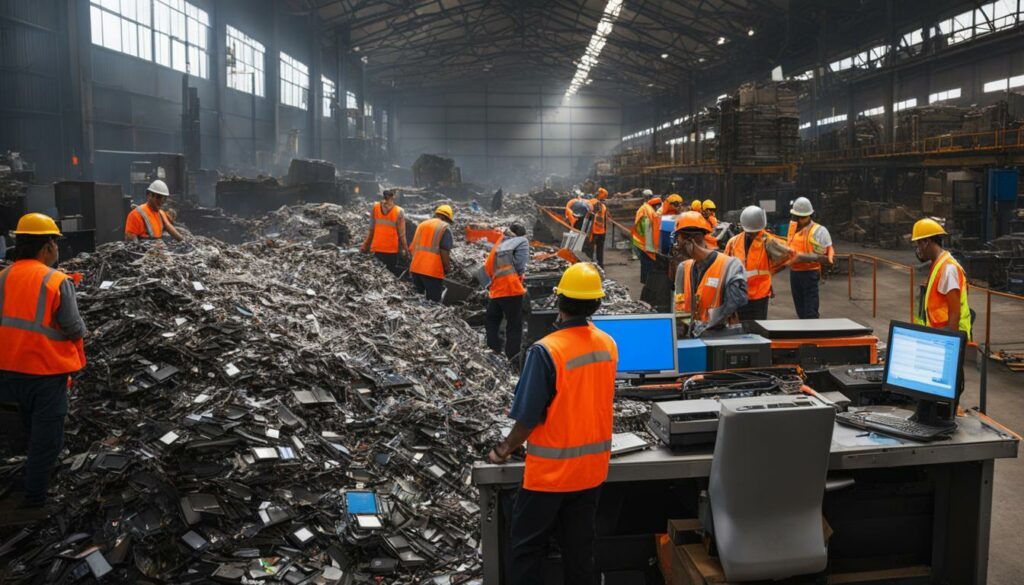
Recycling offers numerous benefits for businesses, ranging from cost savings to environmental responsibility. By implementing effective recycling practices, businesses can reduce waste disposal costs and generate revenue from selling recyclable materials. This not only helps to improve the bottom line but also contributes to a more sustainable future.
One of the significant advantages of recycling is the reduction of waste sent to landfills. By diverting recyclable materials from the waste stream, businesses can minimize their environmental impact and conserve natural resources. Additionally, recycling helps to reduce greenhouse gas emissions associated with waste disposal, further mitigating climate change.
Engaging in recycling initiatives also helps businesses enhance their reputation and comply with environmental regulations. By demonstrating a commitment to responsible waste management and sustainability, companies can attract environmentally conscious customers and partners. Moreover, recycling aligns with the increasing demand for businesses to adopt green IT practices, contributing to a positive brand image.
The Benefits of Recycling for Businesses:
- Cost savings through waste disposal reduction
- Revenue generation from selling recyclable materials
- Reduction of waste sent to landfills
- Conservation of natural resources
- Reduction of greenhouse gas emissions
- Enhanced reputation and compliance with regulations
- Alignment with green IT practices and sustainability
By embracing recycling, businesses can not only contribute to a more sustainable future but also enjoy the tangible benefits it brings. From financial savings to a positive brand reputation, recycling is a win-win solution for businesses seeking to make a difference.
| Benefits | Description |
|---|---|
| Cost savings | Reduce waste disposal costs and generate revenue from selling recyclable materials. |
| Environmental impact | Minimize waste sent to landfills, conserve natural resources, and reduce greenhouse gas emissions. |
| Reputation and compliance | Enhance brand reputation and comply with environmental regulations, attracting environmentally conscious customers and partners. |
| Green IT practices | Align with the demand for sustainable IT practices, contributing to a positive brand image. |
Conclusion
Recycling plays a crucial role in waste management and promoting environmental sustainability. IT manufacturers are significantly involved in recycling efforts, contributing to a more sustainable technology future. By identifying recyclable materials, setting up recycling stations, partnering with recycling companies, and educating employees, businesses can make a positive impact on the environment.
Monitoring and evaluating recycling efforts allow for continuous improvement, ensuring that businesses can optimize their recycling practices. The benefits of recycling for businesses are numerous, including cost savings, environmental benefits, enhanced reputation, and compliance with regulations. Incorporating recycling into waste management strategies helps reduce businesses’ carbon footprint and showcases their commitment to sustainable practices.
As we move towards a greener future, it is essential for IT manufacturers and businesses to prioritize electronics recycling, data destruction services, and IT asset disposal. By working together, we can create a more sustainable technology landscape, where green IT solutions and responsible recycling practices are the norm. Let us embrace recycling as a vital part of our sustainable journey and strive for a future where waste is minimized, resources are conserved, and the environment is protected.
FAQ
How can IT manufacturers contribute to recycling efforts?
IT manufacturers play a vital role in giving a second life to electronic waste, a significant component of the more than 10,000 tons of waste generated worldwide each year. They contribute to recycling efforts by implementing new technological tools, such as 3D printing, that allow for the recycling of plastic waste and the creation of new materials from recycled materials, including organic waste.
What are the common recyclable materials in the IT industry?
Common recyclable materials in the IT industry include paper and cardboard, plastic products, glass, metals, electronics, and food waste.
How can businesses set up recycling stations?
To set up recycling stations, businesses should have separate bins for different types of materials and designated containers for food waste. Clear labeling and easy accessibility to recycling stations will encourage employees to participate, increasing the recycling rate. Working with recycling companies, such as Bailey’s Skip Hire & Recycling, can streamline the recycling process for businesses, ensuring responsible waste management and compliance with environmental regulations.
Why is employee education important for recycling programs?
Employee education is essential for the success of recycling programs in businesses. By providing training and resources, businesses can create a culture of environmental responsibility and increase the recycling rate. Educating employees about the importance of recycling electronic waste, data destruction services, and proper disposal of IT equipment contributes to sustainable and responsible IT practices.
What should businesses monitor and evaluate in their recycling programs?
Regular monitoring and evaluation of a business’s recycling program are crucial for identifying areas for improvement and tracking progress. Metrics to consider include the amount of waste collected and recycled, employee engagement with recycling initiatives, and cost savings resulting from recycling efforts. This evaluation helps businesses optimize their recycling efforts and contributes to more sustainable and efficient waste management.
What are the benefits of recycling for businesses?
Recycling offers several benefits for businesses. It can lead to cost savings by reducing waste disposal costs and generating revenue from selling recyclable materials. Additionally, recycling reduces the amount of waste sent to landfills, conserves natural resources, and reduces greenhouse gas emissions. Demonstrating a commitment to recycling and environmental responsibility enhances a business’s reputation and helps comply with regulations.

